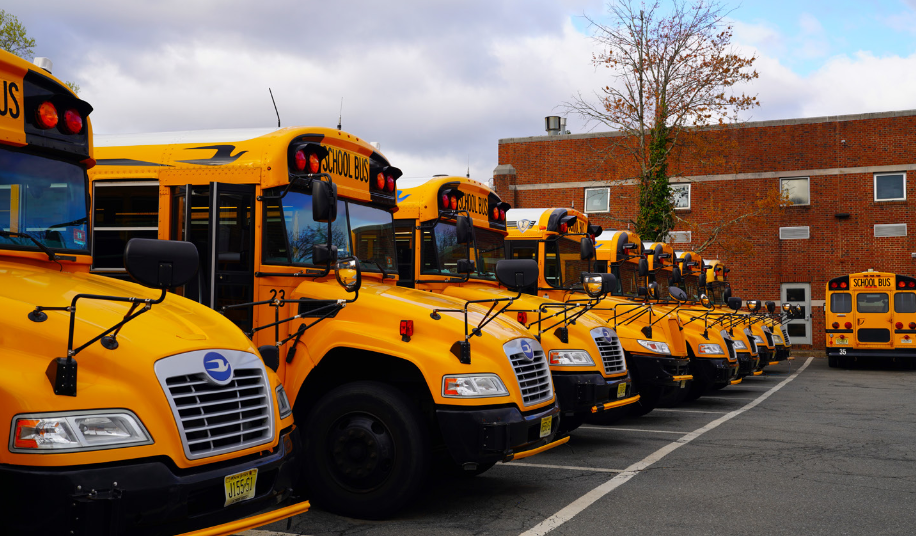PPS purchases two electrical busses
April, 2025
Photo: Charley Hu
The current fleet of Princeton Public Schools’ busses sit in a parking lot behind the PPS administrative office.
In a step towards a more sustainable future, Princeton Public Schools recently announced their purchase of two electric school buses and an electric bus charger.
The district hopes to receive the two 54-passenger Blue Bird electric school buses by the end of August and have them running by the start of the 2025–2026 school year.
The cost of the buses without state aid is $1,013,069.48. However, a roughly $700,000 NJ Department of Environmental Protection grant and around $40,000 in federal aid reduces the out-of-pocket cost for the district to $300,000, which is comparable to the price of two standard gasoline buses.
“It is our responsibility as elected officials to ensure that the vehicles carrying our children to school do not adversely affect their health outcomes as they grow. That’s why my administration has dedicated $30 million to date to ensuring that those vehicles are powered by clean energy,” said New Jersey Governor Philip Murphy during a press conference announcing the grant.
The grant was designed to replace the district’s few remaining diesel buses, which will be decommissioned, with a safer and more environmentally friendly option. The remaining buses will have standard gasoline powered engines. 12 other districts in New Jersey with diesel buses received similar grants.
“Not having diesel fumes will make the air quality a little safer for the community [and] a lot safer for the kids that ride on those two buses,” said Jenny Ludmer, a program manager at Sustainable Princeton who organized much of the purchase.
An average gas-powered vehicle emits around 12,000 pounds of carbon dioxide every year, compared to around 1,500 for electric vehicles. The school also purchased a $212,000 bi-directional electric charger for the buses, allowing the district to store any excess energy until needed. In NJ, the vast majority of electricity is either from nuclear power or natural gas.
Though the electric buses have a limited range, Ludmer assures that they will not cause any problems and are suited for the district’s transportation needs.
“[Its range] is around a hundred miles, so it’s less than what most vehicles have,” said Ludmer. “But [while] the district does have some long distance routes, these buses would not get used for that situation — they would only be used locally — so they’re not gonna have a problem.”
In the future, Ludmer hopes that the district can acquire an all-electric fleet of busses. Princeton University recently finished converting its campus-wide Tiger Transit system into an all-electric fleet, as part of its net-zero carbon emissions initiative.
“This is a proof of concept that the electric buses are going to work well, be easy to maintain, and be quieter — and have a more enjoyable ride that way. I think with proof of concept and with additional funding, the district can continue to add more buses to their fleet that are electric,” said Ludmer.
However, Adam Bierman, a current member of the Board of Education, is skeptical that the district will be able to purchase a complete fleet of electric busses in the near future.
“The process right now is very volatile.You have a federal administration that is not pro-electric. Then we might even have a Republican governor — I’m saying this as a nonpartisan — that might want to do some DOGE-type cuts in New Jersey. The funding is really up in the air,” said Bierman.
PHS students, for their part, are excited about the potential for an all-electric fleet in the future.
“[The current seats] are often ripped and uncomfortable — and they can’t clean them either,” said Griffin Short 27, who rides a regular bus to school. “The engine noise, you can just hear so much. It’s really distracting and especially early in the morning, it [makes] it hard to focus. Then, obviously it’s much better for the environment using an electric vehicle than gas-powered.”